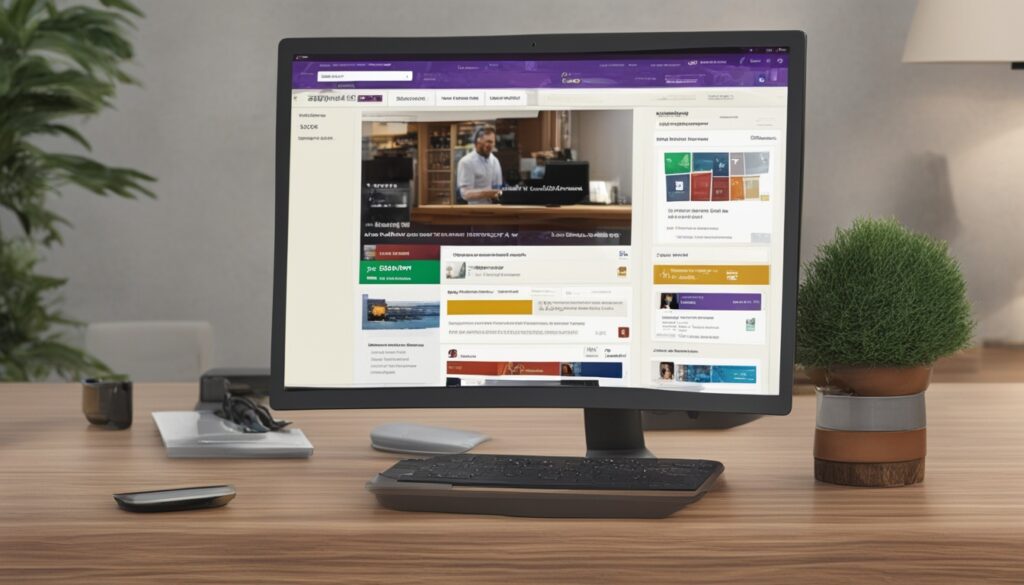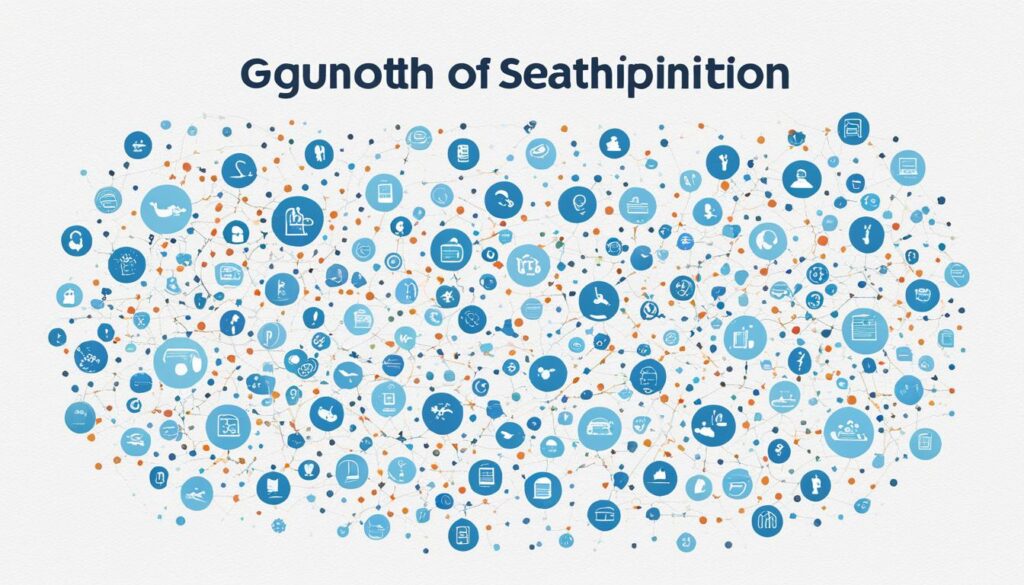How did the digital age change how we see and handle our online reputation? This question is key to our look into online reputation management’s history. We’ll explore the digital world, seeing how brand image and ORM trends have changed over time.
The story of online reputation started in the late 1990s, when the internet was new. In 1999, sites like RateItAll.com, Deja.com, and Epinions.com started, making over a million dollars from reviews in their first year1. This was the start of a new chapter in how brands and consumers interact.
As the digital age moved forward, managing online reputation got more complex. The early 2000s saw online reviews on business directories like Yellow Pages and City Search2. This made a world where consumer opinions were more connected.
The mid-2000s brought a big change with social media. Sites like Yelp made online reviews popular, changing how businesses and people managed their online image2. Now, big names like Amazon, Google, and TripAdvisor lead in online reviews, with 55% of shoppers starting their research on Amazon1.
Looking ahead, ORM keeps evolving. New software lets businesses keep track of and answer reviews on different platforms, showing how important a good online image is2. The digital age has made managing reputation a key part of business strategy.
Key Takeaways
- Online reviews started in the late 1990s with early platforms
- Business directories added review features in the early 2000s
- Social media changed how we manage online reputation
- Big names like Amazon now lead in reviews
- Advanced ORM software is now key for businesses
- Managing online reputation is now vital for business
The Dawn of Online Reputation: Pre-Internet Era
Before the internet, businesses used word of mouth and traditional media to shape their image. Public relations were key in managing reputations. Companies spent a lot on print ads to connect with their audience.
The idea of managing reputation goes way back to ancient times. In those days, trustworthiness was judged by complex systems. This showed how crucial a good reputation was for success.
The Industrial Age brought new challenges and chances for managing reputation. Businesses used mass ads and print media to shape public opinion on a big scale. This was when public relations started to take shape, thanks to pioneers like Ivy Lee and Edward Bernays.
As we moved towards the digital age, managing reputation was set for a big change. The ARPANET, starting in 1969 with just four computers, was the start of the Internet3. This tech change would soon change how we handled reputations online.
“Reputation is like fine china: once broken it’s very hard to repair.” – Abraham Lincoln
The switch from traditional to digital was slow but big. In 1972, electronic mail was introduced on ARPANET, making communication faster and more direct3. This led to new challenges and chances in managing online reputations.
| Era | Primary Reputation Management Tools | Key Characteristics |
|---|---|---|
| Ancient Civilizations | Word of mouth, trading systems | Focus on merchant trustworthiness |
| Middle Ages | Bards, poets, oral traditions | Reputation as a political tool |
| Industrial Age | Print advertising, mass media | Wider reach, institutional PR |
| Early Digital Age | ARPANET, electronic mail | Faster communication, global reach |
The Rise of the Internet and Early Online Presence
The internet’s dawn changed how we handle our digital tracks. In 1999, online reviews started with sites like Epinions, RateItAll, and Deja, gathering over 1 million reviews4. This was the start of a new chapter in e-commerce and customer feedback.
Soon, website development changed to fit this new trend. By 2001, Yellow Pages and City Search added online review options for local shops, helping users make better choices5. This change empowered consumers and changed how companies handled customer service.

Early search engines were key in making these reviews easy to find. Google bought Deja’s Usenet search tech in 2002, making old discussions and reviews easier to access. This move set the stage for Google’s future lead in online reviews.
Online reviews kept growing fast. By 2009, Yelp had 4.5 million reviews since starting in 20044. Yelp added a response feature that year, letting businesses talk back to customers. This was a big step forward in managing online reputations.
In the 2010s, it became clear how crucial online reviews are for shoppers. Today, 90% of people check reviews online before visiting a place6. This fact shows how vital online reputation is for businesses, pushing them to work on a good online image to win trust.
Social Media Revolution: A New Frontier for Reputation
Social platforms changed how we manage our online reputations. They gave consumers a bigger voice and brought new challenges to businesses. Facebook started Pages for Businesses in 2007, drawing in over 50 million active businesses and 2 million advertisers7.
Social media’s effect on reputation is huge. With 1.97 billion people on Facebook every month, the reach for both good and bad content is huge7. This big audience means viral content can spread fast, whether it’s a touching customer story or a bad review.

User-generated content is now key in shaping what people think of a brand. A huge 79% say it affects their buying choices8. This shows how important it is for companies to engage with customers and listen to their feedback to keep a good online image.
“In the age of social media, every customer interaction is a potential viral moment. Businesses must be prepared to respond swiftly and thoughtfully.”
The influencer marketing industry is set to hit $24.1 billion by 2025, showing how powerful social platforms are in shaping opinions8. With 72% of brands using influencers, it’s clear they see the value in using social media for managing their reputation8.
| Platform | Active Users/Usage | Impact on Reputation |
|---|---|---|
| 1.97 billion monthly users | Widespread reach, business pages | |
| Snapchat | 400 million snaps daily | Real-time, ephemeral content |
| 88% of businesses use for marketing | Quick dissemination of information |
The rise of social media has made managing our online reputations more complex and important than ever. Companies need to be careful in this new world. They should use the chances it offers while also dealing with the risks of being more visible and having more user content.
Search Engines and the Power of Information Accessibility
In 1999, the web had about 800 million pages on 3 million servers, with most servers for business9. This set the stage for search engines to become key to finding information.

Google became a top search engine, changing how we find and see information. Their algorithms pick certain content to show, out of millions of options10. This made it crucial for businesses to work on search engine optimization to stay visible online.
Google reviews became more important with search results. About 75% of what shows up on a brand’s search page can be controlled by the company10. This made Google My Business very important for managing a company’s reputation.
Search engines do more than just rank websites. They guide internet growth with rules on website speed and being mobile-friendly10. This shows how important it is to follow search engine rules for better visibility and reputation.
The Birth of Online Reputation Management (ORM) as an Industry
As the internet grew, a new field started to help brands stay positive online. Online Reputation Management (ORM) became key for brands, with 58% of top companies seeing its value in marketing11. This led to the creation of firms that specialize in ORM and digital marketing.
People started looking online for info, making ORM more important. With 59% of shoppers checking online before buying and 97% reading reviews, companies saw how crucial their online image was12. This led to better ways to watch over brands online.

ORM companies started offering services for the digital world, like fixing bad reputations and handling crises. These services were crucial, shown by United Airlines losing over $1 billion after a viral incident12. This showed the need for quick and strong ORM in today’s digital world.
The industry grew, with B2B spending on ORM expected to hit 35% by 201911. This matches the fact that 84% of job seekers look at a company’s reputation as an employer13.
| ORM Impact | Percentage |
|---|---|
| Consumers avoiding untrustworthy brands | 60% |
| Positive reviews increasing trust | 74% |
| Users not looking past first page of search results | 95% |
ORM grew to handle more parts of online presence. This includes managing reviews, with 53% of customers wanting quick responses to negative feedback13. It also means improving search engine results, since only 5% look beyond the first page13. ORM’s growth shows its big role in shaping how people see brands and in business success online.
Historical Context of Online Reputation: From Past to Present
The way we manage reputations has changed a lot over time. In the past, it was all about personal interactions. Then, mass media came along and changed how people saw things. Now, the internet has made managing your reputation a complex task.
Online shopping brought us verified reviews, changing how we pick products and services. Now, 72% of people trust online reviews to decide if they should trust a business. And, 92% are more likely to go to a business with a good rating14.
Having a good online reputation can really help a business. For example, a one-star increase on Yelp can make a restaurant earn 5% to 9% more money. This shows how important being seen as trustworthy online is14.
Online reviews have been around for over 20 years, starting in 1999. Yelp started in 2004 to help people find reliable local services. Now, the 5-star rating system is everywhere, affecting what people buy and how much money businesses make.
A strong reputation is not just about good reviews. It also helps companies attract better employees and charge more for their products. These companies also have customers who buy more from them15. This shows how important it is to keep improving your reputation to gain trust and succeed.
| Aspect | Impact on Business |
|---|---|
| Online Reviews | 72% rely on them for trust |
| Star Rating | 92% prefer 4+ star businesses |
| Revenue Impact | 5-9% growth per star increase |
| Customer Loyalty | Increased with positive reputation |
Technological Advancements Shaping Modern ORM Practices
Today, online reputation management (ORM) has changed a lot. Thanks to new technologies, how businesses manage their online image has changed a lot. Artificial intelligence and machine learning lead this change, making it easier to watch and understand a lot of online data in real-time.
AI-powered sentiment analysis quickly tells companies what people think. This lets businesses act fast on any negative feedback. This can really change how people see a brand16. Data analytics tools give deep insights into what customers do and think, helping make better strategies for managing a company’s reputation.
Automation has made it easier to keep an eye on what people say about a brand across different platforms. Now, companies can quickly respond to customer feedback, which helps build better relationships with customers. Research shows that answering negative reviews quickly can turn bad situations into chances to improve the brand1617.
These technologies help companies be more proactive in managing their reputation. Predictive analytics can spot potential problems before they get worse. This lets businesses take steps to protect their online image.
“In the digital age, a company’s reputation can change in an instant. Advanced technologies are our best defense and offense in managing this reality.”
These tech changes have a big effect on how businesses do. A study at Harvard Business School found that a one-star increase on Yelp can lead to a 5-9% increase in sales17. This shows how important good ORM, with modern tech, is for a company’s success.
Conclusion: The Future of Online Reputation Management
The future of online reputation management (ORM) is changing fast. Brands are now taking control of their online image. Social media has changed how businesses work, making them set up accounts that match their brand18.
AI is making ORM strategies better. Now, over 90% of people check online reviews before buying something19. To keep up, companies are using AI for analyzing feelings, predicting trends, and making content automatically1819.
We’ll see more focus on being open and ethical online. Personalized ORM strategies will get even better, fitting what each customer likes. AR and VR could also change how we improve online reputations18. As the internet changes, businesses must keep up with trends like user-made content, privacy issues, and AI to stay positive online19.
FAQ
What is online reputation management (ORM)?
How has online reputation management evolved over time?
What role did social media play in the evolution of ORM?
How have search engines influenced online reputation management?
What led to the emergence of ORM as a distinct industry?
How has the historical context of reputation management evolved?
What technological advancements are shaping modern ORM practices?
What does the future hold for online reputation management?
Source Links
- History of Online Reviews | 1440.io – https://www.1440.io/blog/history-of-online-reviews/
- A History of Online Reviews – https://reviewinc.com/2021/09/07/a-history-of-online-reviews/
- A Brief History of the Internet – Internet Society – https://www.internetsociety.org/internet/history-internet/brief-history-internet/
- The History of Online Reviews and How They Have Evolved – https://results.shopperapproved.com/blog/the-history-and-evolution-of-online-reviews
- The History Of Online Reviews And How They Have Evolved – https://www.linkedin.com/pulse/history-online-reviews-how-have-evolved-saket-shahare
- The Evolution of Online Reputation Management: Past to Present – https://www.netreputation.com/evolution-online-reputation-management/
- Advances in Social Media Research: Past, Present and Future – Information Systems Frontiers – https://link.springer.com/article/10.1007/s10796-017-9810-y
- The Changing Truths About Social Media and Consumer Behavior – https://meshagency.com/social-media-consumer-behavior/
- Accessibility of information on the web – Nature – https://www.nature.com/articles/21987
- Are Search Engines Responsible For Reputation? Yes, Virginia, They Are. Big Time! – https://searchengineland.com/search-engines-responsible-reputation-yes-virginia-big-time-224984
- The History of Reputation Management – https://blog.reputationx.com/history-of-orm
- A Beginner’s Guide to Online Reputation Management – https://www.semrush.com/blog/online-reputation-management/
- Online Reputation Management: How to Protect Your Brand | InMoment – https://inmoment.com/blog/online-reputation-management/
- The History of Online Reviews | Expert Reputation – https://expertreputation.com/the-history-of-online-reviews/
- Reputation and Its Risks – https://hbr.org/2007/02/reputation-and-its-risks
- Why Online Reputation Management Is Important – Noble House Media – https://noblehousemedia.com/why-online-reputation-management-is-important/
- Top Benefits of Hiring Online Reputation Management Experts – https://ossisto.com/blog/reputation-management-expert/
- The Future of Online Reputation Management: Trends and Innovations to Watch – https://konnectinsights.com/blogs/future-of-online-reputation-management/
- The Future of Online Reputation Management and Emerging Trends – Zeka Design – https://www.zekagraphic.com/online-reputation-management-trends/

